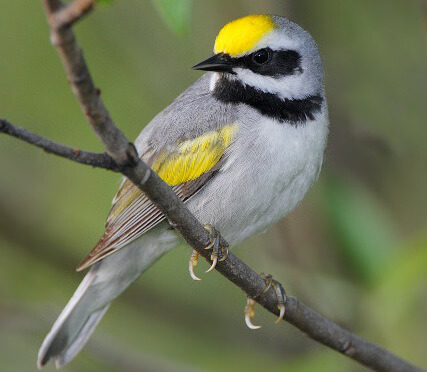The Golden-winged Warbler

The golden-winged warbler (GWWA) is an early-successional species whose songs have captivated many. Vermont is currently the only New England state that hosts a population of these unique and beautiful birds, which require a special habitat of sparse trees and shrubs, with an understory of grasses and forbs, all adjacent to a forested area. In addition golden-wings are ground-nesting birds and prefer hardwood rather than softwood trees.
According to Audubon Vermont, however, golden-wing populations are declining throughout all of their range as early-successional habitats revert to forest and are lost to human development. This includes areas in Central and South America where the warblers migrate to during winter months. These areas are becoming despoiledas land continues to be cleared for production of palm oil, cattle grazing and sun-grown coffee. On a local level, Audubon Vermont is currently working with The Nature Conservancy and Vermont Fish and Wildlife to protect and create the warblers’ habitat through land preservation and/or managing overgrown areas to make them more hospitableto the golden-winged warbler.
The Golden-Winged Warbler (GWWA) Working Group, a national partnership working to protect this species and keep it from being listed as federally endangered, has identified the southern Lake Champlain Valley as a conservation focal area for its work.
Based on breeding bird survey data, and according to Audubon Vermont, golden-wing populations have declined on average 3.4 percent per year in the United States over the last 37 years of monitoring. According to the Cornell Lab of Ornithology, there has been a drop of 66 percent since the 1960s. These declines are shown in the lossof the species from areas that have supported the golden-winged warbler for at least the last hundred years.
Audubon Vermont aims to continue, and begin, conversations with local land trusts and conservation commissions in order to push efforts forward to protect the habitats of the GWWA. Their best management practices benefit other species as well (for example, the bobcat). Audubon would like to assist land trusts in acquiring properties to be protected and iscurrently using habitat maps to identify and prioritize properties for future protection.
Audubon Vermont, the Charlotte Land Trust and the Charlotte Conservation Commission are scheduling a meeting to discuss how together they can move efforts forward to ensure a stable future for the golden-winged warbler in surrounding areas. The broader public can also weigh in by reaching out to local lawmakers. Audubon Vermont has an alert system, which anyone can sign up for. This will allow someone to get the latest news on proposals that impact birds and to weigh in on the merits of those proposals. In addition, one can purchase Habitat Stamp money, which is managed and allocated by VT Fish and Wildlife. The proceeds from these purchases benefit surrounding conservation efforts.
If you are a landowner who believes your property might be or could become breeding and nesting grounds for the golden-winged warbler, you might be eligible for funding from VT Fish and Wildlife. If approved, your land could be managed for specific efforts or for a particular species. Please contact the Department of Fish and Wildlife for more information.
Erika MacPherson is a board member of the Charlotte Conservation Commission. The commission meets the fourth Tuesday of the month. All are welcome.

